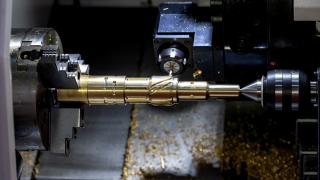
A common misconception surrounding our membership is that it is purely subcontract engineering suppliers who use us to fill spare capacity. Whilst it’s true that a majority of our members operate exclusively on a subcontract basis, we also have a number of OEMs who use our services to fill capacity as and when it arises.
For instance, I recently brought a company on board who predominantly manufacture tools for the construction industry. As the nature of the work generally lends itself to turning capabilities, this company would occasionally find themselves with capacity on their lathe. Another member - a shopfitting accessories manufacturer based in the West Midlands - found themselves with a similar predicament, although their capacity favoured sheet metal and general fabrication work. In both instances, it was vital that these companies were able to find additional work to bridge the gap and stay healthy during quieter times.
If a manufacturer has never offered subcontract engineering services before, then it can be difficult to know where to start. However, we’ve been able to help a lot of companies in similar situations, who were unsure as to how to proceed and get the word out about the wider scope of their capabilities. While OEMs generally benefit from a more consistent workload and improved forecasting capabilities, one thing is for sure - they certainly aren’t immune from peaks and troughs. To avoid getting caught short, OEMs should ask themselves the following questions:
Is Our Work Seasonal?
If your main product line is subject to seasonal demand, then it may be necessary to take on subcontract work when you’re off-peak.
If your main product line is subject to seasonal demand, then it may be necessary to take on subcontract work when you’re off-peak. The beauty of subcontract work is that there is a constant demand from all manner of industries, meaning that you needn’t be tied down to the fluctuations exhibited by your core sector. After all, if you’ve got the equipment, you can do the work no matter the sector!
If you’re looking to take on work from industries with a focus on safety-critical components, then you might want to consider becoming accredited. Whereas approvals such as ISO 9001 are useful across the board, sectors such as aerospace, automotive and marine may require you to hold additional certificates before you’re able to undertake any subcontract work on their behalf. Remember, these accreditations can be expensive and require a lot of time investment, meaning that it’s best to weigh up the pros and cons first of all.
Are We Proactive Even When We’re Busy?
While it’s never easy to prioritise new business when you’re trying to meet demand for your own product, it’s important to have a back-up plan in place for when times get tough.
Unfortunately, there are many manufacturing companies who ‘live in the moment’, so to speak, failing to make contingencies for when work tails off. This is true of both OEMs and subcontract engineering suppliers alike, leaving both parties with a desperate struggle to find work under a market downturn.
While it’s never easy to prioritise new business when you’re trying to meet demand for your own product, it’s important to have a back-up plan in place for when times get tough. This can be as easy as asking your existing customers if they have any other requirements you could potentially fulfil - it doesn’t necessarily mean hitting the phones and cold-calling every other business in a fifty-mile radius!
Am I Utilising All Of My Equipment?
You could uncover a valuable revenue stream and realise your full manufacturing potential.
With this in mind, it’s worth assessing your equipment to see if there’s capacity to be filled in other areas. Just because your own product has most of your machines running 24/7, doesn’t mean that there aren’t additional opportunities available amongst some of your lesser-used plant. By taking the time to establish whether you have any hidden capacity, you could uncover a valuable revenue stream and realise your full manufacturing potential.
Will Investment Prevent Me From Becoming Pigeon-Holed?
It’s worth considering which processes, if any, you sub out yourselves.
Many manufacturers have an in-house setup that favours their own products, but may ultimately prevent them from taking on a wider scope of subcontract engineering work during slower seasons. This can lead to the company becoming pigeon-holed as a through-and-through OEM, preventing them from diversifying into a potentially lucrative business sideline.
This is why it’s good to keep investment in mind should your finances allow. By conducting market research into the most sought-after subcontract services, you can move with the market, instead of against it. It’s also worth considering which processes, if any, you sub out yourselves, as this may be an indication of the manufacturing market as a whole.
The latest plant & equipment will help you to remain competitive - this goes for both subcontract engineering services and your own products. Some of the latest plant is so advanced that it will improve quality and allow for the most cost-effective method of manufacture, meaning that you’re likely to see a return on investment and uphold your reputation as a quality manufacturer.
--
Qimtek are experts in connecting quality engineering suppliers with active manufacturing buyers. If you would like to find out how we can help you to grow your business, please give us a call on 01256 394 500.